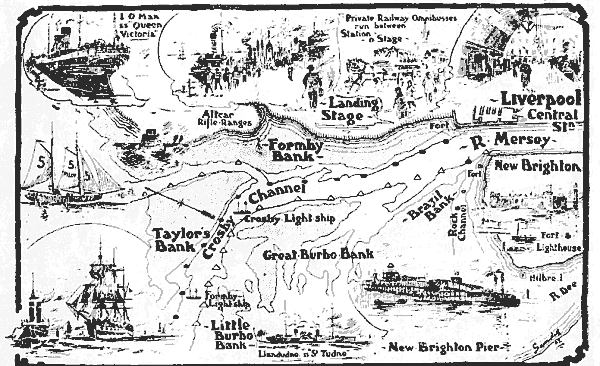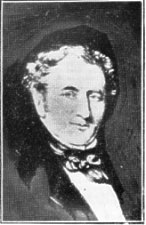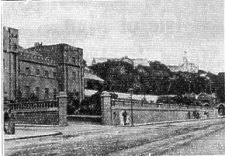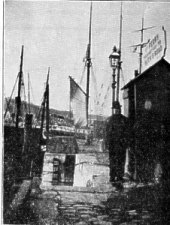
This map shows part of Capt. Gill's channel as it exists to-day.
[From The Manxman, #4 1911]
"Captain Gill, as the discoverer of the Victoria Channel, has rendered essential service to the port of Liverpool, and has claims on our merchants and shipowners.' Liverpool Mercury. April 17th. 1852.

This map shows part of Capt. Gill's channel as it exists to-day.
It is eighty-one years to-day (August 17th) since Captain Wm. Gill first navigated a øteamer out of Liverpool. The route then was through the Rock Channel, which was only available at high water. Present-day visitors who wish to actually see this route for themselves can do so by taking a trip on the North Wales steamer, " La Marguerite"--of course, at high water. When they get outside, if they look to the right they will see a vast expanse of sea which covers all sorts and shapes of sand-banks, and this wide expanse they must imagine without the Crosby, Formby and Bar " Ships," and also without any of the numerous '1 black cau " ai:d "red conical " buoys, which easily and accurately mark the road over which Liverpool's enormous commerce now comes.

Captain Wm. Gill., the discoverer of the present channel into Liverpool.
Think of the brains, patience and skill exhibited by this fine Manx Captain, who, alone among hundreds of mariners of his day, quietly tackled the problem and found that, after all, a channel existed between those banks and that no longer need the business of Liverpool be at a standstill while the tide was low. There is, of course, no one alive to-day who actually saw Gill do it, but the venerable John Bell, who kept the halfpenny ferry at the foot of Ridgeway Street, Douglas, died only a year or two back. He began his career at sea as deck boy, under Gill, on the "Queen of the Isle," in 1836. I used to talk to him about the Channel. He said it was a " proper nuisance " to the crew, for Gill: would, day by day, out with his paper and pencil, and taking all sorts of bearings on the land, such as Leasowe Castle and the Beacon on Bidston Hill, record the water found, two sailors, port and starboard, using the lead meanwhile, this no doubt being the " nuisance " complained of. But there was more trouble for them besides. Gill would lower his anchor some two or three feet below the draught of his steamer and, dragging this with him, let it go when he got nearly ashore on a sand-bank. In this way did this splendid man discover the Channel which has made the modern shipping fortunes of Liverpool.
It thus befel that, in 1852, when he retired from the sea the public subscription mentioned last month was organized, taking, roughly speaking, the following proportions:-Liverpool contributed about 8/16ths, the Isle of Man about 3/16ths, the shipbuilders cf Glasgow about 2/16ths, distant places, altogether, about 2/16ths, and, for what reason I do not know the town of Preston, separately, 1/16th. I should imagine that the town of Preston would be one of the first places to suffer from Liverpool being provided with a better channel. That the Scottish shipbuilders were grateful to Gill is evidenced by the fact that the contributing names were the very cream of the profession, viz:-Robert Napier, J. Napier, J. R. Napier and John Napier, J. Thompson, G. Thompson, D. Elder, John Elder, Alex. Elder and A. Boyd. To the Liverpool names which I mentioned last mouth might be added J. Holmes, Jas. Aitken. Jas. Eckersley, J. W. Wilson, the list being a long one.
A committee of the Liverpool subscribers then decided to purchase " a complete solid silver breakfast and tea service, namely, a full-sized coffee-pot, tea pot, sugar basin and cream jug; a silver chased toast rack, four very richly-chased candlesticks, a silver butter cooler with cover and stand, 12 silver teaspoons, sugar tongs and two very elegant butter knives." Then follows a long description of the shapes, ornamentation, &c. " On the top of the coffee and tea pots are two emblematical devices-one, representing that for the sailing vessels, being formed of a rudder, sail, and block grouped together. the other consisting of a large paddle wheel, funnel and steering-wheel . . on the coffee pot is inscribed, under the figure of a yacht, the names of the sailing vessels commanded by Captain Gill, and under a steam vessel the names of the 'Mona's Isle,' 'Queen of the Isle,' 'King Orry,' 'Ben-my-Chree ' and 'Tynwald,' the steamers which have been under his charge." In addition to the silver articles there were " three handsome papier mache waiters," and a " complete service of china in white and rich gold." The silver article, had the initials " W. G." upon them, but the. Principal inscription " cut in sans seriff letters," reads: " To Captain William Gill, the discoverer of the Victoria Channel into Liverpool, this service of plate," etc., etc. The plate was supplied by Mr. Joseph Mayer, Lord Street, and the china by Mr. Livingstone, also of Lord Street, Liverpool. Finally, the "purse which contained the gold was worked in royal blue and ornamented with metal beads and tassels, it being "knitted especially for the occasion by a young female who is blind, and, under the circumstances, is looked upon as a gres', curiosity." In this manner, therefore, did Liverpool express gratitude for her new Channel.

Castle Mona Hotel at the time of the banquet. [actually between 1894-1897]
Out of compliment to the captain it was decided that the presentation should take place in Douglas, the Liverpool subscribers having ample notice, and many of them going over for the occasion. Accordingly, at the Castle Mona Hotel, on June 17th, 1852, Mr. 'Moore, then speaker of the House of Keys, handed over, during a public banquet, the presents to the hero of the day, who replied as follows:-" Captain Gill said that for thirty-seven years he had been a worker but now he was a talker, and he found that his tongue would not answer its helm, so that he was left to float about on an unknown track (cheers). They would no doubt understand him when he stated that he never before felt more completely at sea in all his life, but their many kindnesse,3 to him in years gone by and their liberality on that occasion convinced him that they could look with a lenient eye on all his defects (applause). He hoped they would believe him when he said that he, with a sailor's heart, deeply felt a sailor's gratitude. More he could not say." (Loud cheers). Was there ever a short speech more admirable or in better taste? "Dear old captain," as Tom Brown called him. He died six years afterwards and was buried directly facing the main entrance to the churchyard, at Kirk Braddan. On the chief headstone are these words: " In memory of Captain William Gill-, who died January 25th, 1858, aged 63 years. He was the first captain of the Company's steamships from Douglas to Liverpool, and the discoverer of the Victoria Channel into the Port of Liverpool." The grave is in need of some repair, and the tall iron railings which surround it, of paint. I hope either Douglas or Liverpool will see to this. Finally, all these particulars have been brought under the notice of the Lord Mayor of Liverpool (S. Mason Hutchinson, Esq.), and I sincerely hope that something may be done to perpetuate in Liverpool the name of the shipmaster who sought out the Channel.

The late John Bell, the last survivor of those who helped Gill with the soundings.
Since the above was written I have come across some further references to Captain Gill in various old newspapers, some being of such interest that I feel I must find room for at least a couple. The first advertisement of the Steam Packets did not appear in the Liverpool newspapers, strangely enough, till August 20th, three days after the " Mona's Isle ' had made her first trip. It was headed, " Superior conveyance for Douglas, I.O.-," and set forth that the " uncommonly fast sailing steamer `Mona's Isle,' William Gill, commander, will sail regularly from Georges Dock Pierhead, every Monday, Wednesday and Friday, till further notice." No fares are mentioned. But it continues:-" This fine vessel was built at Port Glasgow in the present year, and is allowed to be the handsomest steamer of her class that has yet floated on the Clyde." Later on it is stated that "her cabins are spacious and combine comfort with elegance," and finally, " Families and parties tivho prefer it may be accommodated with private cabins." What big one, they must have been?
The first "Mona's Isle" on which Capt. Gill beat the "Sophia Jane" and "St. George."
The second is a letter to the Editor of the "Liverpool Mercury" which appeared on October 1st, 1830, the full text being:-" Your impartiality in giving insertion to correct communications has induced me to forward you a few particulars respecting the interesting opposition at present existing in steam navigation with the Isle of Man. The triumphant result of the competition between the 'Mona's Isle' and the `Sophia Jane' is pretty well known and needs no remark, which induced the St. George Company to try their last resource by placing the 'St. George' on the station, confident that (although the 'Sophia Jane' was beaten) the 'St. George could not share a similar fate.
On Wednesday last the 'Mona's Isle-' and the 'St. George ' were opposed to each other in their passage from this port, and the 'Mona's Isle ' performed the distance in a shorter time, but it was on Friday that their safety was put to the test. On that day they left here together, about 11 o'clock a.m., the wind blowing right ahead and approaching to a storm, which continued to increase during the day. At 4 p.m. the hull and smoke of the 'St. George ' were left out of sight. The 'Mona's Isle ' arrived in Douglas a few minutes before one o'clock on Saturday, and the 'St. George ' not until nearly seven, being a difference of six hours in favour of the Manx boat. This is certainly the most surprising feat ever performed in steam navigation, particularly when the hitherto unrivalled character of the 'St. George ' is taken into consideration, and also the tempestuous state of the weather during the passage. Although the facts do not make in favour of many of your respectable townsmen, yet I have no doubt you will give them a place in your paper, from which it will appear that great improvements are taking place in steam navigation, and it is difficult to say where these improvements may terminate." Improvements? Compare the " Mona's Isle " with the " Ben-my-Chree."
T. E. E.
|
|
||
|
|
||
|
Any comments, errors or omissions gratefully received
The Editor |
||